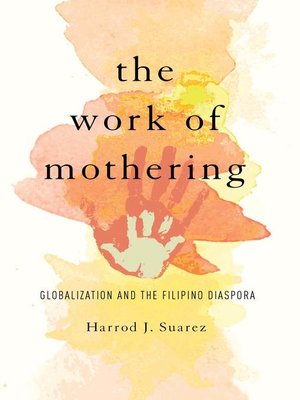The Work of Mothering
ebook ∣ Globalization and the Filipino Diaspora · Asian American Experience
By Harrod J Suarez

Sign up to save your library
With an OverDrive account, you can save your favorite libraries for at-a-glance information about availability. Find out more about OverDrive accounts.
Find this title in Libby, the library reading app by OverDrive.



Search for a digital library with this title
Title found at these libraries:
| Library Name | Distance |
|---|---|
| Loading... |
Harrod J. Suarez's innovative readings of this cultural production explores issues of diaspora, gender, and labor. He details the ways literature and cinema play critical roles in encountering, addressing, and problematizing what we think we know about overseas Filipina workers. Though often seen as compliant subjects, the Filipina mother can also destabilize knowledge production that serves the interests of global empire, capitalism, and Philippine nationalism. Suarez examines canonical writers like Nick Joaquín, Carlos Bulosan, and Jessica Hagedorn to explore this disruption and understand the maternal specificity of the construction of overseas Filipina workers. The result is a series of readings that develop new ways of thinking through diasporic maternal labor that engages with the sociological imaginary.
| Cover Title Contents Acknowledgments Prologue Introduction 1. Excessive Writing and Filipina Time 2. Filming the Dream Nevertheless 3. Listening to Cinematic Orphans 4. Multicultural Belonging and a Potent Silence Conclusion Epilogue Notes Bibliography Index |"The Work of Mothering offers an innovative reading into the margins of texts, thus questioning knowledge production and interrogating our epistemological systems." —Literary Research"With cogent observations on contemporary fiction, poetry, film, migration, domestic labor, and politics, Harrod Suarez illuminates the fraught ways in which the Philippines is imagined as Inang Bayan, 'mother country.' The Work of Mothering beautifully captures the nuances of language, gesture, and emotion, demonstrating how the practice of careful reading can help us look beyond the oppressive structures of nation, gender, and capital and rethink the most foundational of human relationships."—Josephine Lee, coeditor of Asian American Plays for a New Generation
"Suarez uses literature to envision alternative ways of being, of inhabiting the world, unfettered from limits proscribed by the ideology of the national and contemporary globalization. The Work of Mothering successfully harnesses the literary imagination to envision a different political and cultural future." —MELUS
|Harrod J. Suarez is Assistant Professor of English and Comparative American Studies at Oberlin College.







